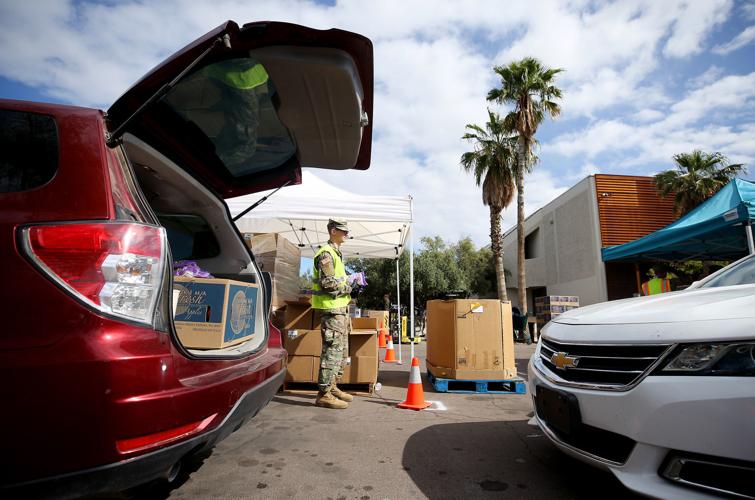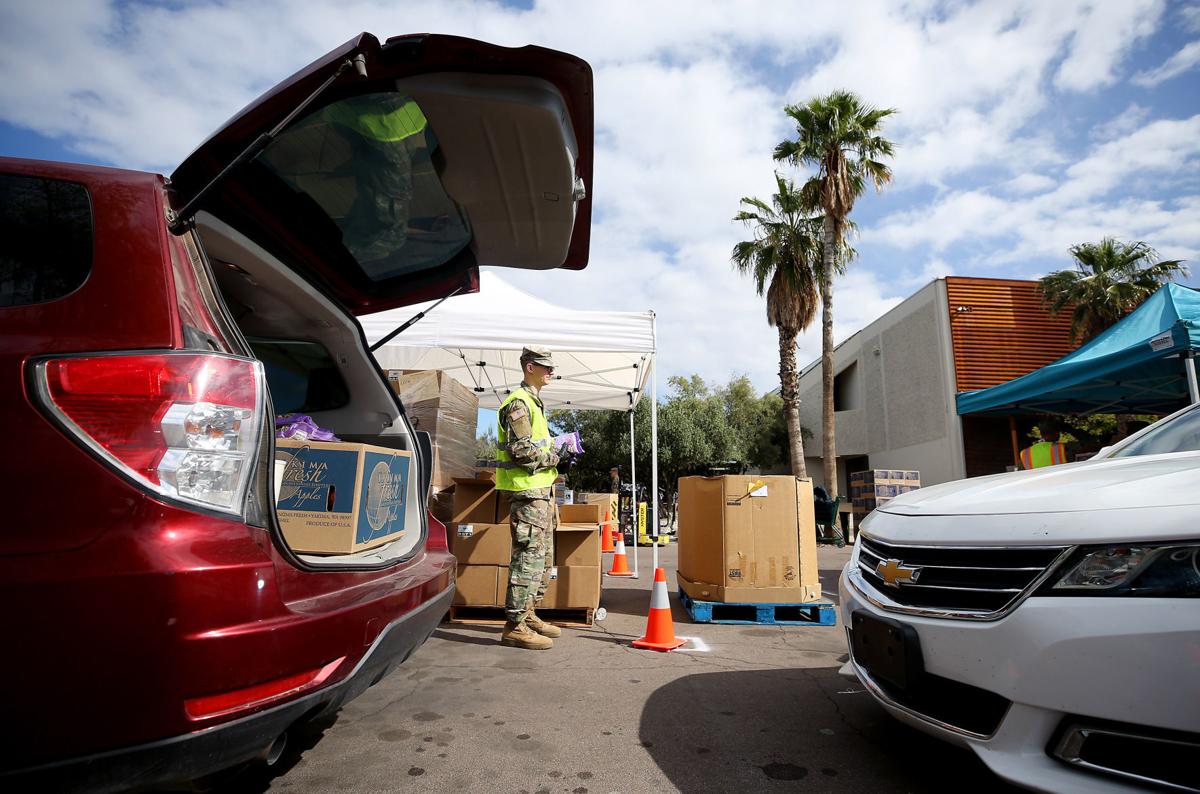Now that the stimulus money is poised to flow, let’s think about steering it in the right direction.
People who file taxes individually and make less than $75,000 will get $1,200 each, and married couples filing jointly who make less than $150,000 will get $2,400. Plus, taxpayers with children will get another $500 for each child. For a family of four, that could add up to an unexpected $3,400 sometime in the next month or two.
Individuals making up to $99,000 and couples making up to $198,000 also will receive payments, but they will be lower, the more the person makes.
Some of us desperately need the money, because we’ve lost a job, had our hours cut, or lost business as a result of the epidemic and the resulting downturn. For others of us, who haven’t suffered such misfortunes, it may be a pure windfall.
The money isn’t even taxable, so there are no strings attached.
I’m going to try to attach some strings, though: Those who don’t need the money really ought to give it to or spend it on those who do need it in this sudden crisis.
The simple way is, if you know people who need help, just give it to them, in whatever amount you want. The whole logic of the stimulus is that people know best where to spend their money. That certainly goes for many people in need.
Alternatively, you can support beloved Tucson-area businesses that are teetering as a result of our efforts to slow the spread of the virus.
But there are potential advantages to donating part or all of your stimulus payment to charities, as well. Although the payment is not taxable, any donation to a qualified charity will be tax deductible for those who itemize deductions, said accountant David Cohen, the president of Beach Fleischman.
Even those who take the standard deduction can deduct up to $300 for donating that much or more to charity, he noted.
Michael McDonald, the CEO of the Community Food Bank of Southern Arizona, said its main location, at 3003 S. Country Club Road, has seen more than double the usage that it did at the same time last year.
“We’re seeing a huge increase in the number of new folks coming in because of job loss, cutback of hours, or being laid off,” McDonald said.
Charities like the food bank will be happy to accept however much you can give. There are several new efforts, though, at funneling relief specifically to the needs of people affected by the COVID-19 crisis.
Both the Community Foundation for Southern Arizona and the United Way of Tucson and Southern Arizona have set up COVID-19 relief funds that will channel donations to nonprofit groups that help vulnerable people with needs like food, medical care, diapers, health supplies, bill payment and other urgent needs.
“I hope this will help to bolster the organizations that are already doing front-line emergency service work with the most vulnerable in our community,” said United Way president Tony Penn.
Any money donated to either fund will be passed through to the organizations providing the services.
A similar setup exists at Phoenix-based Arizona Together, a new effort to coordinate volunteers and collect donations, set up in concert with the state government. Donations are similarly distributed to nonprofit groups carrying out relief efforts and are specifically distributed to buy personal protective equipment for medical personnel and first responders. They’re also directed to helping low-income students get the technology needed to participate in online classes.
It may be a while before the money arrives. The best guess is sometime in April for those who have received direct deposits from the IRS, and later for those who will receive checks. If you can afford the risk of a glitch in the system, you can donate now what you expect to receive later, since the needs are already exploding.
If not, there undoubtedly will still be needs when your payment arrives.
Contact: tsteller@tucson.com or 807-7789. On Twitter: @senyorreporter.
Photos for March 27: Tucson gets by during coronavirus pandemic
Tucson, coronavirus, tattoos
Updated
The doors are still open at Sacred Art Tattoo on 1024 E. 6th St., as of Friday, March 27, 2020, Tucson, Ariz.
Tucson, coronavirus
Updated
Seth Nadeau, left, and his son Anthony Nadeau get out of the house for a couple of game so horse under cloudy skies on the courts at Christ Church United Methodist, March 27, 2020, Tucson, Ariz.
Tucson, coronavirus
Updated
Victoria Quintero, 5, holds her sign as her mother, Vanessa, waves to the teachers and administrators from John E. White Elementary School and Pistor Middle School during a Car Parade through the neighborhood on March 27, 2020. The teachers and administrators drove their cars through the neighborhood to say hello to their students from their cars.
Tucson, coronavirus
Updated
Teachers and administrators from John E. White Elementary School and Pistor Middle School cheer and wave to their students during a Car Parade through the neighborhood on March 27, 2020. The teachers and administrators drove their cars through the neighborhood to say hello to their students from their cars.
Tucson, coronavirus
Updated
Standing, Kai Morales, left, and his twin brother, Kristian, hold up their signs as Karim, 9, and their mother, Angelica, sit in the bed of the truck along W. Nebraska Street during a Car Parade on March 27, 2020. The teachers and administrators drove their cars through the neighborhood to say hello to their students from their cars.
Tucson, coronavirus
Updated
Students of John E. White Elementary School and Pistor Middle School stand along W. Nebraska Street and wave to their teachers during a Car Parade on March 27, 2020. The teachers and administrators drove their cars through the neighborhood to say hello to their students from their cars.
Tucson, coronavirus
Updated
Teachers and administrators from John E. White Elementary School and Pistor Middle School line up along W. Canada Street before the start of their Car Parade on March 27, 2020. The teachers and administrators drove their cars through the neighborhood to say hello to their students from their cars.
Tucson, coronavirus
Updated
The noted bull testicles on the statue outside Casa Molina at Speedway and Wilmot, usually painted in various schemes and wild colors, now sporting a surgical mask.
Tucson, coronavirus
Updated
Pfc. Gustavo Escalera, of the Arizona National Guard, waves in the next car to his station at the Southern Arizona Community Food Bank on March 27, 2020. The Arizona National Guard has been activated to help the demanding need to fill and handout food boxes for people in Tucson and five counties in southern Arizona. Thirty troops arrived in Tucson on Thursday and another thirty are expected. According to Spc. John Randall, the troops are here to fill in the gaps in logistics to help keep up the production of putting together and handing out food boxes.
Tucson, coronavirus
Updated
Spc. Nicholas McCormick, of the Arizona National Guard, waits for the next car to pull up at the Southern Arizona Community Food Bank.
Tucson, coronavirus
Updated
Spc. Emilio Maldonado, of the Arizona National Guard, pushes a several bags down an assembly line at the Community Food Bank of Southern Arizona on March 26, 2020. The Arizona National Guard has been activated to help the demanding need to fill food boxes for people in Tucson and five counties in southern Arizona.
Tucson, coronavirus
Updated
Spc. Gabriel Molina, of the Arizona National Guard, fills bags with food items on an assembly line at the Community Food Bank of Southern Arizona on March 26, 2020. The Arizona National Guard has been activated to help the demanding need to fill food boxes for people in Tucson and five counties in southern Arizona.
Tucson, coronavirus
Updated
Hoover Zhu, owner of Old Peking, poses for a portrait inside a closed Old Peking at Old Peking , 2522 E. Speedway Blvd., in Tucson, Ariz., on March 25, 2020. Zhu closed Old Peking on Thursday March 25 due to the Coronavirus Disease (COVID-19).
Tucson, coronavirus
Updated
Chef Du Liyuan makes a take out order at Chef Wang, 356 E. Grant Rd., in Tucson, Ariz., on March 25, 2020. Chef Wang, a local Chinese restaurant, is open for take out but is considering closing due to the Coronavirus Disease (COVID-19).
Tucson, coronavirus
Updated
Before Tuesday’s change in policy, Arizona residents traveling to New York had to quarantine for 14 days. New Jersey and Connecticut also removed their travel restrictions.
Tucson, coronavirus
Updated
An empty baggage carousel at the Tucson International Airport, on March 26, 2020.
Tucson, coronavirus
Updated
Wendy Fu, owner of Chef Wang, processes a take out order at Chef Wang, 356 E. Grant Rd., in Tucson, Ariz., on March 25, 2020. Chef Wang, a local Chinese restaurant is open for take out but is considering closing due to the Coronavirus Disease (COVID-19).
Tucson, coronavirus
Updated
Chairs tilted in on tables at La Cocina located at 201 N. Court Avenue, on March 26, 2020.
Tucson, coronavirus
Updated
Sun sets over a dark and locked Hi Corbett Stadium, home to the Arizona Wildcats baseball team, as the city begins its second week under COVID19 restrictions, March 26, 2020, Tucson, Ariz.
Tucson, coronavirus
Updated
Downtown Congress Streets is mostly deserted just before 8 p.m. as the city begins its second week under COVID19 restrictions, March 26, 2020, Tucson, Ariz.
Tucson, coronavirus
Updated
The lanterns from the Reid Park Zoo's Asian Lantern Festival sit in a fenced compound after the zoo's closure ended the display weeks early as the city begins its second week under COVID19 restrictions, March 26, 2020, Tucson, Ariz.
Tucson, coronavirus
Updated
Residents stay spaced while out getting some air and watching the Rillito River flow near Craycroft as the city begins its second week under COVID19 restrictions, March 26, 2020, Tucson, Ariz.
Tucson, coronavirus
Updated
Jayden Simmons, right, 12, runs football drills with coach Bobby Rodriguez, owner of Jet Sports Training, at Silverlake Park, in Tucson, Ariz., on March 25, 2020. Due to gyms being closed, Rodriguez is taking classes and training outside to parks with little to no equipment.
Tucson, coronavirus
Updated
A man wearing a mask watches traffic go by while waiting for the bus on N. Alvernon Rd., in Tucson, Ariz., on March 25, 2020.
Tucson, coronavirus
Updated
Gloves, a mask and hand sanitizer sit on the counter at Chef Wang, 356 E. Grant Rd., in Tucson, Ariz., on March 25, 2020. Chef Wang, a local Chinese restaurant is open for take out but is considering closing due to the Coronavirus Disease (COVID-19).







